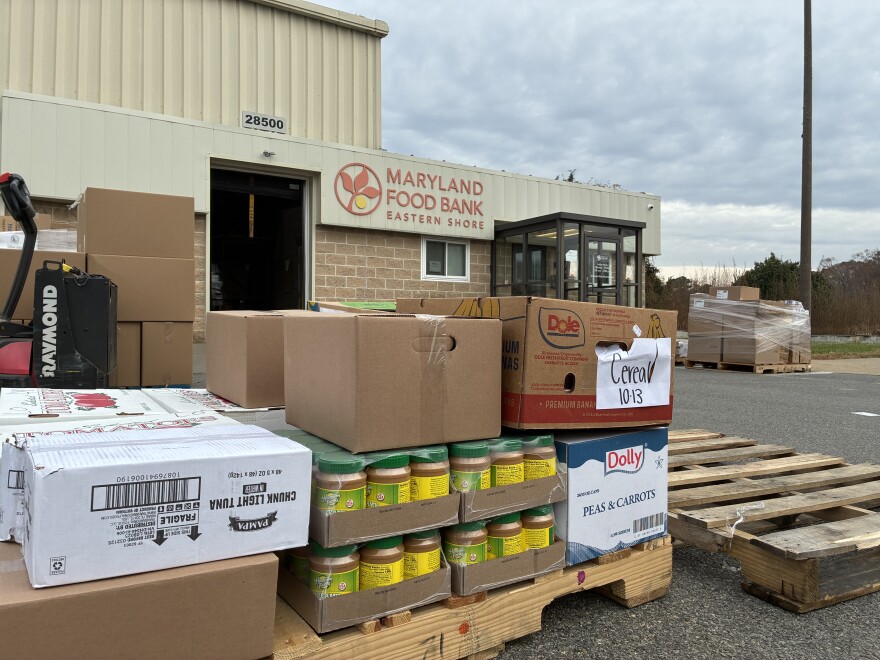Maryland and Delaware are among the wealthiest states in the nation, yet about one third of us have to stretch to pay for rent and food each month. As inflation rises, so does the need for food assistance, especially on the Eastern Shore. With Thanksgiving approaching, Kevin Diaz checked in with food shelves up and down the shore.
RUSSO: National statistics say that Maryland and Delaware are among the wealthiest states in the nation, yet about one third of us have to stretch to pay for rent and food each month. I'm Bryan Russo. As inflation rises, so does the need for food assistance, especially here on the Eastern shore. So with Thanksgiving approaching, we sent Kevin Diaz to check in on food shelves all across the shore.
FOOD LION EMPLOYEE: "Have a good one! How are you? It's $9.98"
DIAZ: Here at the food line in Fruitland, it's starting to look a lot like Thanksgiving. The grocery lines are longer. The people shopping carts are brimming with Turkey and the fixings to go with it. It's been no less hectic at the food pantry, at the Delmarva Evangelistic Church in Salisbury, where Pastor Robert Gregory oversees food distribution to those who can't afford big Thanksgiving Day spreads.
GREGORY: We just had 220 cars come yesterday for Thanksgiving week and we gave out turkeys and we gave out all the food that we could give out. We were overwhelmed with the number of cars. That's more than tripled here in the last month and a half.
DIAZ: Moreover, he said he's seeing a lot of new faces.
GREGORY: Need is great. A lot of seniors are really feeling the pinch right now.
DIAZ: The situation has been much the same in Pocomoke City, where we spoke to Denise Pettit at the Helping Hand Outreach Ministry.
PETTIT: Well, we had actually started getting an overflow before, well, right ahead of the Thanksgiving season with the cut of the benefits.
DIAZ: Since the end of the government shutdown, federal food stamp benefits known as SNAP have been restored, but the need, Pettit said, continues.
PETTIT: We have seen a lot of new people coming in with needs for food. We've seen families that are emerging where they're unable to maintain their own household as usual. So it has been a real demand.
DIAZ: We asked her how it compares to a year ago.
PETTIT: Very, very different because along with giving out the food, you have to give out some encouragement. We can see that fear is trying to creep in and we try to encourage them that we will do the best that we can and we're sure that the other food pantries will also.
DIAZ: What has really struck pet it is the number of families and seniors she's seeing these days.
PETTIT: You've got all ages now. You've got the seniors, you've got the middle age, you've got the young mothers...
DIAZ: Over at the Haven Ministries Food Pantry in Queenstown, they're seeing record traffic, some of it the spillover from the government shutdown.
JAMES: This has been our busiest month ever in November due to the shutdown.
DIAZ: That's Amanda James who runs the food pantry for Haven Ministries.
JAMES: We had 40 new clients sign up in nine days. Normally we have 30 to 35 a month. Last month we saw, I think 96 new families and then we had 40 sign up in the first 90 days of the month. So it's definitely been a significant increase.
DIAZ: Some are furloughed workers, you said some are SNAP beneficiaries who started looking for new resources when their benefits were delayed at the start of the month. While the government shut down clearly had an impact, other affordability factors clearly are coming into play. For people living on Social Security, rents account for an increasing share of their monthly living expenses. More than a third of households on the lower shore either live in poverty or have a hard time making ends meet even though they're employed.
JAMES: So the cost of living has increased so significantly that in order to buy food, you just can't do it. Especially for young people and young families.
DIAZ: On the Eastern shore, there are other unique factors at play as well. We went to Seaford, Delaware to talk to Pastor Willeme Thomas of the Church of Nazarene made up largely of Haitian immigrants.
THOMAS: We serve 527 on one day.
DIAZ: The need has become more dire among the Haitian communities' poultry workers, many of whom are facing the loss of federal visa protections.
THOMAS: Many people that are immigrant layoffs from work because of the work permit, there is thousands of them that lose their work permit and they were laid off at Purdue, Mountaire, Tyson and [?] farm. So that's increasing.
DIAZ: So, put it all together, and this is indeed a Thanksgiving to celebrate our blessings, and to be mindful of the less fortunate. For Delmarva Public Media, this is Kevin Diaz










